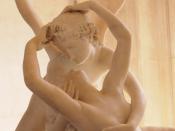The characters of the myth "Cupid and Psyche", humans and gods alike, reveal hysterical emotions and reactions towards their concerns, or wants. In other words, Rational reasoning often appears absent in the story line which, in my opinion, generates weakness and flaws in development of the relationship between the two leading characters.
From the tale, we learn that Psyche is a beautiful princess, so much so that the goddess Venus becomes exceedingly jealous. With the intent to eliminate the threat to her, she instructs her son, Cupid, whom some others call Love (which is to later discuss in the paper), to make her fall in love with a dreadful monster; but even worse than the contrary to her expectations, he not only fails, but falls in love with the very threat to his mother's status. He then becomes her intangible husband - in voices - visiting her only at night.
Psyche's curiosity grows as days go by; she could not help but disobey her unseen husband's orders - to not attempt to look at him - and in doing so, she seems doomed to lose him; Cupid escapes to his mother. In Psyche's search for her "love", she decides to go to Venus, and then undertakes a series of cruel and evilly-plotted tasks that are set by her, in which she succeeds in accomplishing with help, in the hope of winning him back. The author, Lucius Apuleius, tells us that in the end, Cupid manages to rescue her from suffering, and pleads their appeal to the gods. In consequence, Psyche is authorized to become an immortal, the goddess of Soul, and the "lovers" are married in heaven.
In ancient China, the intellect regard a "saint", inferior to God, as someone nearly flawless in knowledge, temperament and personality...


